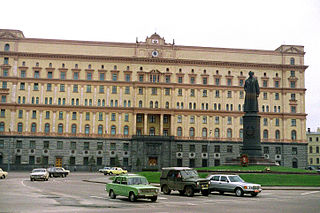
The Australian Secret Intelligence Service is Australia's foreign intelligence agency. ASIS was formed in 1952, but its existence remained secret even within the Government until 1972. ASIS is part of the Australian Intelligence Community responsible for the collection of foreign intelligence, including both counter-intelligence and liaising with the intelligence agencies of other countries. In these roles, ASIS is comparable to the British Secret Intelligence Service (MI6), Canada's Canadian Security Intelligence Service (CSIS) and the American Central Intelligence Agency (CIA).

The Petrov Affair was a Cold War spy incident in Australia in April 1954, concerning Vladimir Petrov, Third Secretary of the Soviet embassy in Canberra.
The following lists events that happened during 1983 in Australia.
The Parliamentary Joint Committee on Intelligence and Security (PJCIS) is a joint committee of the Parliament of Australia which oversees Australia's primary agencies of the Australian Intelligence Community: Australian Security Intelligence Organisation (ASIO), the Australian Secret Intelligence Service (ASIS), the Australian Signals Directorate (ASD), the Defence Intelligence Organisation (DIO), the Australian Geospatial-Intelligence Organisation (DIGO), and the Office of National Assessments (ONA).
The Australian Intelligence Community (AIC) and the National Intelligence Community (NIC) or National Security Community of the Australian Government are the collectives of statutory intelligence agencies, policy departments, and other government agencies concerned with protecting and advancing the national security and national interests of the Commonwealth of Australia. The intelligence and security agencies of the Australian Government have evolved since the Second World War and the Cold War and saw transformation and expansion during the Global War on Terrorism in response to current international and domestic security issues such as terrorism, violent extremism, cybersecurity, transnational crime, counter-proliferation, support to military operations, and Pacific regional instability.
The Minister for Justice was a portfolio in the Australian government between 18 September 1987, when the post was held by The Honourable Michael Tate, and 20 December 2017, when the last incumbent of the office was The Hon. Michael Keenan. Keenan was appointed to the post on 18 September 2013. Following a rearrangement of the Second Turnbull Ministry in December 2017, the post was subsumed into the newly-established portfolio of the Minister for Law Enforcement and Cybersecurity, part of the Home Affairs portfolio.
George Sadil is a former Russian analyst and translator who worked with the Australian Security Intelligence Organisation (ASIO) for nearly 25 years including during the height of the Cold War. After it had been revealed the ASIO had been compromised by a Russian KGB 'mole', investigations were held and after internal audits conducted by both ASIO (Jabaroo) and the Australian Federal Police, Sadil was accused of being the mole. After raids on the homes of many of their analysts and translators, the authorities found highly classified documents in Sadil's home, he was then charged with possessing classified federal documents under the Crimes Act 1914. In 1994 the case against him collapsed. Sadil's profile did not match that of the mole in question, and prosecutors were unable to establish any kind of money trail between Sadil and the KGB.
Richard Prichard "Ric" Throssell was an Australian diplomat and author whose writings included novels, plays, film and television scripts, and memoirs. For most of his professional life as a diplomat his career was dogged by unproven allegations that he either leaked classified information to his mother, the writer and communist Katharine Susannah Prichard, or was a spy for the Soviet Union.
Tudor Harvey Barnett was an Australian intelligence officer. Barnett was Director-General of Security, the head of the Australian Security Intelligence Organisation (ASIO), from 1981 to 1985.
Peter Robert Woolnough Barbour was an Australian intelligence officer and diplomat. He was also the Director-General of Security leading the Australian Security Intelligence Organisation (ASIO) from 1970 to 1975.
Paul Dibb AM is an English-born Australian strategist, academic and former defence intelligence official. He is currently emeritus professor of strategic studies at the Strategic and Defence Studies Centre which is part of the Australian National University.

The National Intelligence Coordination Committee (NICC) is a peak intergovernmental officials-level body of the Government of Australia responsible for the development and co-ordination of the Australian Intelligence Community in accordance with the National Security Committee of Cabinet. The NICC is chaired by the Deputy Secretary of National Security and International Policy of the Department of the Prime Minister and Cabinet and its subcommittees are chaired by the Director General of the Office of National Assessments.

George Ronald Richards, known as Ron Richards, was a British-born Australian police officer and intelligence operative. In 1953 he was closely involved in Operation Cabin 12, arranging the defection of Vladimir Petrov from the Soviet Union to Australia. In 1954, he was appointed Deputy Director-General of the Australian Security Intelligence Organisation (ASIO), roughly equivalent to the FBI and MI5. He received the Order of the British Empire in 1957.









